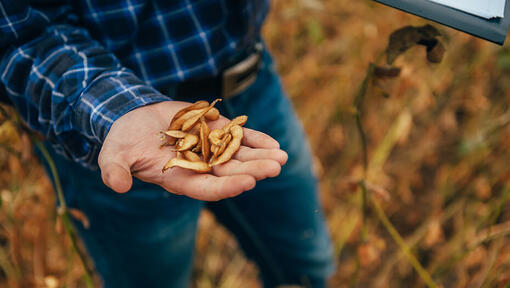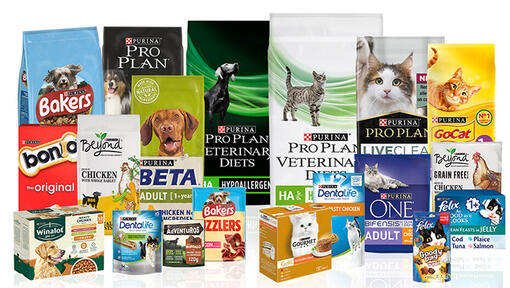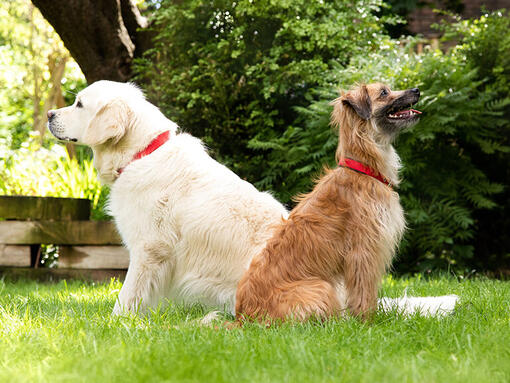
Sustainability
At Purina, we are committed to providing high-quality nutrition for pets while protecting our planet for future generations.
Tackling climate change cannot wait and neither can we.
As part of the Nestlé family, we share the ambition to halve our greenhouse gas emissions by 2030 and reach net zero by 2050 – even as our business continues to grow. We have the size, scale and reach to make a massive difference.
Achieving net zero emissions will involve big changes that will transform our business. Going forward, our path to net zero will focus on four key areas for accelerated action:
- Sourcing ingredients sustainably
- Transforming our product portfolio
- Evolving our packaging
- Driving efficient manufacturing and logistics
Sourcing ingredients sustainably
We are constantly improving our processes to ensure our ingredients are responsibly sourced, with suppliers required to comply with the Nestlé Responsible Sourcing Standard. This helps us to know where our ingredients come from and how they are produced, and to address environmental and social issues such as deforestation, human rights, and animal welfare. Through responsible sourcing practices, we can have a positive impact on the communities within which we operate.
As part of our Purina in Society Commitments, our actions include:
- Working with the Sustainable Fisheries Partnership to evaluate our fish sources, with 76% of our seafood ingredients responsibly sourced by the end of 2020. Our target for 2021 is 90%.
- Atlantic salmon, our most used fish, will be the first to be 100% responsible sourced, or organic, in Western Europe in 2021.
- 99% of our soya being traceable and responsibly sourced by the end of 2020.
- Working with Proforest to evaluate our soya sources, with 100% declared deforestation free in 2020.
We are also working with farmers, suppliers and communities to transform intensive farming practices into regenerative agriculture methods that protect and restore natural resources such as soil, water and biodiversity. Healthier soils are more productive and can store more organic carbon.
Our actions include:
- Collaborating with LENS (Landscape Enterprise Networks) in the UK. The initiative aims to redesign modern farming and develop pioneering regenerative agriculture practices that work harmoniously with nature and are scalable. Businesses from a range of sectors work together and invest in improving the quality and health of the landscapes in which they operate.
- Partnering with the Living Soils Initiative in France to provide training and technical support to farmers who are willing to implement regenerative agriculture practices and measure their impact on soil. The project aims at developing new financial tools to accelerate farmers’ transition to these new methods.
Our goal is to source 20% of key ingredients through Regenerative Agriculture methods by 2025, increasing to 50% by 2030.
Another important aspect of our sustainability efforts is our use of animal by-products. Described as “meat and animal derivatives” on the pet food label, these ingredients come from animals that have passed veterinary inspections as fit for human consumption but are surplus from the human food industry. They tend not to be used for reasons such as low consumer demand and appearance, as they include materials like lungs, kidneys, and livers.
However, there are good reasons to use or ‘upcycle’. These valuable ingredients as they offer safe and quality protein for pets to enjoy, which might otherwise be wasted. The by-products we use are specifically selected for the nutrition they provide. They are easy for cats and dogs to digest and deliver plenty of nutrients, such as essential amino acids, vitamins, minerals, and healthy fats that provide pets with energy and help maintain their health and wellbeing.
In fact, animal by-products can deliver more nutrients than the type of meats popular with pet owners. Kidneys and livers, for example, can contain up to ten times more vitamin B2 (riboflavin) than lean meat.
Transforming our product portfolio
Global food production is set to change dramatically in the next 20-30 years. Consumer expectations and demands are rapidly changing and influencing how we feed our pets, with interest in vegetarian and vegan diets increasing. We also know that demand for meat-based proteins is set to outstrip supply. This is why we have started to explore innovative new ways to provide complete and balanced foods for pets while making better use of the planet's resources.
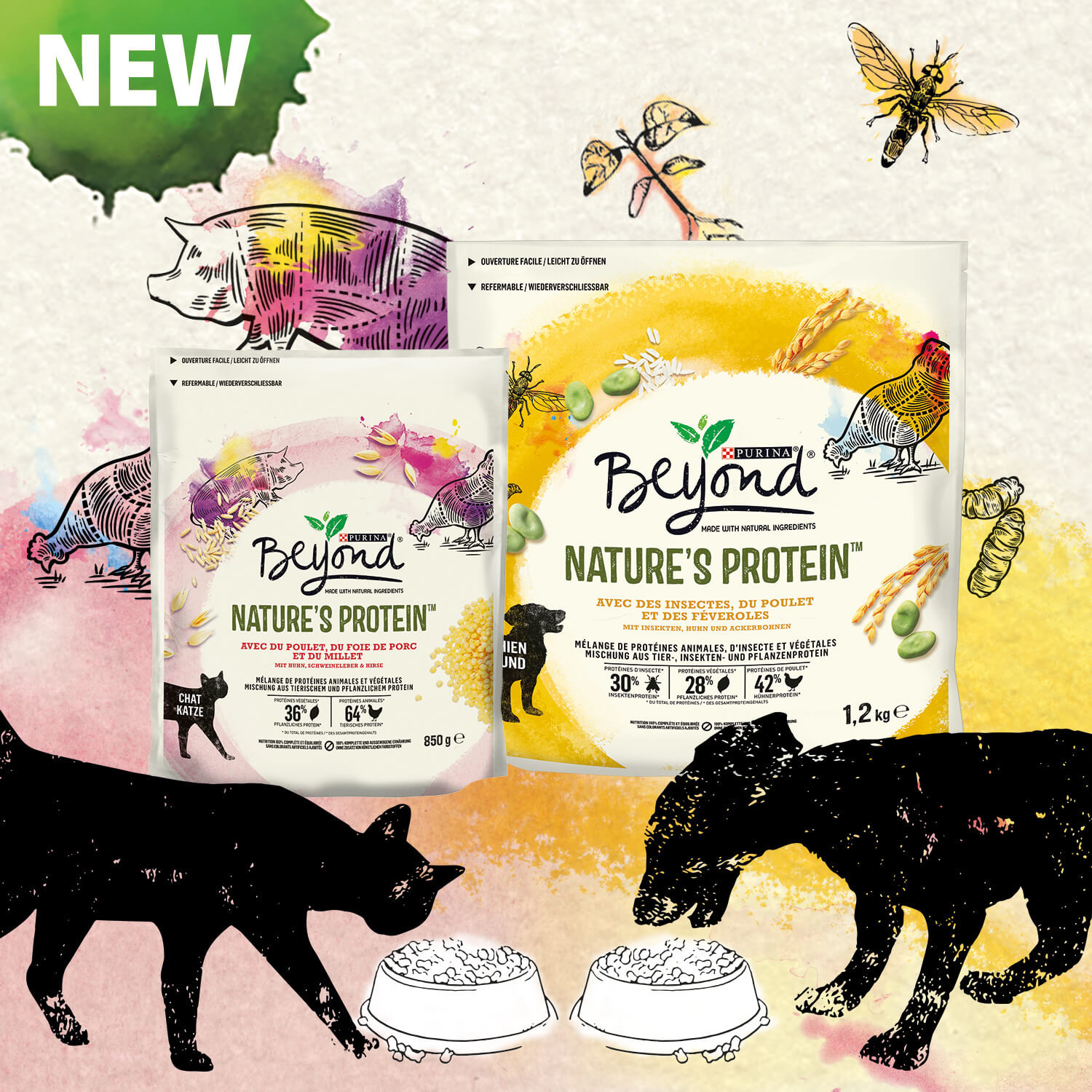
Using our research and development resources and know-how, we will transform our portfolio with products that are good for pets and good for the planet.
Our actions include:
- Exploring a range of protein sources to identify a variety of high-quality ingredients that will ensure we have a sustainable supply of food for our pets, now and into the future.
- Launching our Beyond Nature’s Protein range in Switzerland with alternative proteins. The new line includes insects, as well as plant protein from fava beans and millet.
- Introducing one of Europe’s first upcycled dog treats as a pilot in the Netherlands under our Adventuros brand. By upcycling nutritious surplus grains from breweries that might otherwise be left to spoil, we are able to reduce food waste.
Evolving our packaging
We are also playing our part in solving the problem of plastic packaging waste. It is a complex challenge as packaging plays a critical role in ensuring product freshness, safety and quality from the factory through to the home. We are working on many fronts – finding improved solutions to reduce, reuse and recycle. Find out more about our actions and progress.
Our goal is for 100% of our packaging will be reusable or recyclable by 2025.
Driving efficient manufacturing and logistics
We are reducing the impact of our operations through a combination of improved environmental performance, renewable energy projects and innovative partnerships.
Our actions include:
- All our factories across the UK, Europe, the Middle East, and North Africa being certified zero waste to a landfill. This means that no factory waste goes to landfill or is incinerated without energy being recovered from the process
- Investment to enable the creation of new wind farms to supply 100% of our UK pet food factories’ electricity needs.
We are also building a cleaner and leaner logistics network. Working with the Nestlé European Transportation Planning Hub in York, we are driving further efficiencies.
Our actions include:
- Using the very latest technology to fill vehicles and plan journeys more efficiently, helping to avoid empty miles by connecting inbound and outbound transport.
- Shifting to lower emission routes like rail and shipping.
- Joining the European Clean Truck Alliance, through Nestlé, which backs zero-emission road freight in Europe.
Our goal is to switch our fleet of owned or contracted vehicles to lower emission options by 2022.
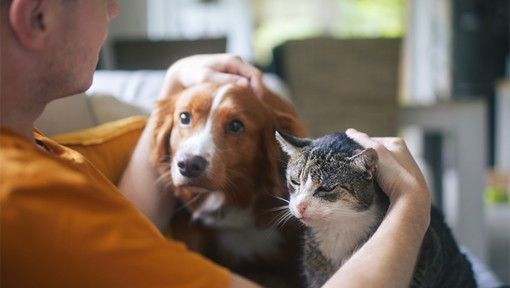
Contact Us
We’re here to answer all of your pet questions - big or small, really serious or a little silly. Get in touch with us directly any time, any way. Our lines are open 24 hours, 7 days a week. Please locate your designated country of residence on the following website: https://www.nestle-family.com/en/contact-us
